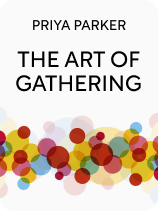

This article is an excerpt from the Shortform book guide to "The Art of Gathering" by Priya Parker. Shortform has the world's best summaries and analyses of books you should be reading.
Like this article? Sign up for a free trial here.
What is the importance of social gatherings? Why do you need a reason to have gatherings?
Before you plan your gathering, whether it’s a formal meeting or party, you need to understand why it’s important to have one. In The Art of Gathering, Priya Parker contends that the first thing you should do when planning your gathering is to identify the reason, or “purpose,” for which you’re gathering.
Continue reading if you want to learn the importance of your social gathering.
Identify the Reason Behind Your Gathering
You need to understand the importance of social gatherings and should have one clear, distinct, and specific reason for gathering that’s not defined by the type of gathering you’re having. For example, a bachelorette party is not a reason; “give my bridesmaids a chance to bond with each other before the wedding” is. Why do you need a reason? Parker explains that without one, you might gather in unhelpful ways. This may result in a missed opportunity to do something meaningful. Alternatively, you might gather in ways that are antithetical to your values; this can happen when you follow traditional customs because you find the custom itself significant but not the original reason the custom was developed.
| How to Identify the Reason for Your Business Meeting Like Parker, business experts recommend that you identify the reason you’re gathering whenever you have a meeting. Without one, your meeting may be unhelpful—not just because you miss the opportunity to do something meaningful or because the meeting doesn’t meet your values, but because it wastes your attendees’ time and stresses them out because they could be doing something useful and productive instead of attending a purposeless meeting. Unlike Parker, business experts suggest that you can have multiple reasons for meeting. To determine whether your meeting’s reason is clear, evaluate it using the S.M.A.R.T. metric. Your meeting should have a Specific, Measurable goal: You should be able to easily measure whether you met that goal during the meeting. This goal should also be something that you can Attain Realistically within the allotted Time for the meeting. |
Additionally, Parker argues that when you have one specific reason for gathering, you can use this reason as a guideline by which to evaluate all the decisions you make at the gathering. A specific reason makes decision-making easier because it presents a clear path to follow, whereas a general reason can be ambiguous and open up too many options when you’re trying to decide on something.
For example, in many Western weddings, the bride’s father walks the bride down the aisle. A modern couple might wish not to do this custom since the ritual stems from back when a wedding signified that the bride was now the responsibility of her new husband rather than her father. But if the couple’s parents find meaning in the custom itself, what should the couple do?
If the couple has one clear, specific reason, such as “to celebrate our union as individuals” (as opposed to, say “to celebrate the joining of our families”) then they know what to do: The custom is not about the individual couple but their families, so they won’t do it. But if their reason is something like “celebrate love” and thus doesn’t specify who the focus of the ceremony is, the reason won’t help them make that decision.
(Shortform note: Having a specific guideline by which to evaluate all your other decisions may also help preserve your cognitive energy when planning a gathering. Having to decide between too many options—as you might when planning a gathering—overwhelms your brain and exhausts you. But if you have a clear guideline to evaluate these decisions, you can trim down your options quickly and not expend as much cognitive energy deciding between them.)
To discover your reason, Parker recommends that you repeatedly ask yourself why you’re gathering until you discover an underlying conviction. For example, if you want to have a bachelorette party, ask yourself why that matters.
(Shortform note: If you have a weekly gathering (like a team meeting), keep in mind that your reason for gathering may evolve as the needs of your group or the format changes. In particular, Parker points out in a separate guide to virtual gatherings that taking your gathering online may change why you’re having it—so you need to identify that reason and adjust accordingly. For example, a weekly team meeting in person may have been a quick way to update the team on the office goings-on; a weekly team meeting online may also provide more opportunities for the team to connect since they now rarely see each other, so you may want to allot a few extra minutes for team members to catch up.)

———End of Preview———
Like what you just read? Read the rest of the world's best book summary and analysis of Priya Parker's "The Art of Gathering" at Shortform.
Here's what you'll find in our full The Art of Gathering summary:
- How to make pre-planned gatherings more meaningful and engaging
- What to do before, during, and after any type of gathering
- Why the host should never relax during their event






